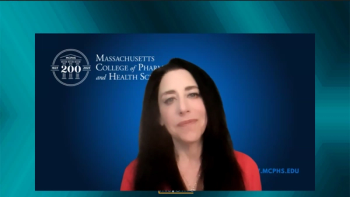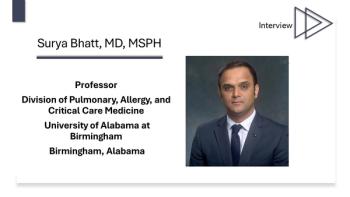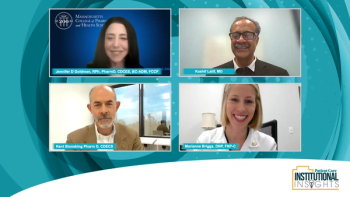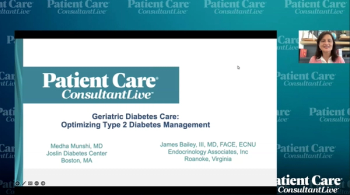
Addressing the significance of acting early in T1D care, a group of diabetes experts delve into the impact of delaying intervention during stage 2 of the condition.

Addressing the significance of acting early in T1D care, a group of diabetes experts delve into the impact of delaying intervention during stage 2 of the condition.

Schafer Boeder, MD and his colleagues provide a comprehensive overview of the stages of T1D in patients with diabetes, highlighting the various signs and symptoms associated with each stage.

A panel of experts on diabetes management introduce themselves and provide an overview of the condition, highlighting risk factors, disease burden, and the benefits of collaborative care.

The dual interleukin-4, 13 inhibitor reduced COPD exacerbation rates by as much as 34% for individuals with COPD with type 2 inflammation, Bhatt explains.

Primary care clinicians are essential to maximizing evidence-based midlife care for women, according to Professor of Obstetrics & Gynecology JoAnn Pinkerton, MD.

The novel dual neurokinin-1,3 antagonist reduced VMS after just 1 week of treatment, Pinkerton said, and improved sleep and quality of life, as well. Hear more.

A panel of experts in the management of diabetes share their key takeaways and clinical pearls for the utilization of teplizumab for the delay of onset of type 1 diabetes.

Kent Stoneking Pharm D, CDECS and Marianne Briggs, DNP, FNP-C share their experiences with the dosing regimen and infusion process for teplizumab. This segment offers an in-depth look at the 14-day course of treatment, providing insights into the patient experience and what individuals can expect during this crucial intervention period.

In this discussion, a panel of diabetes management experts examines the groundbreaking potential of teplizumab, the first FDA-approved therapy of its kind, in delaying the onset of T1D stage progression. They discuss its unique mechanism of action and explore its pivotal role in early intervention strategies.

Dr Jennifer D. Goldman and Marianne Briggs, DNP, FNP-C explore the critical role of antibodies in determining T1D progression and emphasize the importance of regular screening. In this segment learn about the four main antibodies pivotal in T1D screening and stage progression.

Jennifer D. Goldman, RPh, PharmD, CDCES, BC-ADM, FCCP, discusses the stages of T1D progression. She emphasizes the risks of delaying intervention in stage 2 T1D, including heightened DKA risk and severe complications, along with potential treatment efficacy reduction and poorer long-term glycemic control.

Kent Stoneking Pharm D, CDECS, shares his personal T1D story and underscores the critical importance of early diagnosis and intervention for this condition. Following his story, Marianne Briggs, DNP, FNP-C, provides invaluable suggestions for identifying individuals at risk for T1D through effective screening methods.

Kashif Latif, MD defines diabetes, shedding light on the pivotal role of B cells. He introduces the concept of diabetes stages and emphasizes the critical importance of early intervention to prevent complications.

A panel of experts in the management of diabetes addresses the profound burden of type 1 diabetes (T1D), emphasizing heightened familial predisposition for this condition. They explore geographic disparities as well as the role of prediabetes in this patient population.

Medha Munshi, MD, and James Bailey, III, MD, FACE, ECNU, discuss older adult patient cases and review their respective treatment approaches, sharing final takeaways to provide practical insights for managing diabetes in this patient population.

Medical experts discuss the importance of optimizing medication regimens for older patients with diabetes, emphasizing the need to keep treatment plans simple and highlight the value of continuous glucose monitors in monitoring patients and adjusting therapies accordingly.

Key opinion leaders in the management of diabetes discuss the process of deprescribing, or the process of medication simplification to encourage adherence and ease of regimens in older adult populations with type 2 diabetes.

Drs Medha Munshi and James Bailey offer insights into navigating the type 2 diabetes treatment landscape. They emphasize the importance of prioritizing cardiovascular and renal outcomes when selecting treatments for older adult populations.

Medha Munshi, MD, and James Bailey, III, MD, FACE, ECNU, discuss the current treatment landscape for type 2 diabetes, and highlight key considerations for the selection of first-line treatments for older adults with this condition.

Key opinion leaders in the management of diabetes define and discuss the impact and complexities of geriatric syndromes in older adults with T2D. They shed light on challenges like cognitive impairment, urinary incontinence, and neuropathy, offering insights into effective diabetes management strategies for this demographic.

Drs Medha Munshi and James Bailey discuss the definition of older adult patients, considering both chronological age and mental and physical state. They underscore the significance of customizing diabetes treatment to accommodate individual patient abilities, rather than solely basing decisions on age

Medha Munshi, MD, and James Bailey, III, MD, FACE, ECNU, delve into the management and burden of type 2 diabetes (T2D). They shed light on the prevalence of the disease in older adults and its potential health impacts as patients age, while also addressing risk factors and considerations for younger patients as they progress in age.

Dave Singh, MD, lead investigator for the phase 2a COURSE trial of tezepelumab in moderate to very severe COPD, highlights the drug's promise in vulnerable groups.

The triple therapy cut risk of a first cardiopulmonary event by 20% vs dual therapy in addition to significantly reducing COPD exacerbations, PI Singh told Patient Care.





